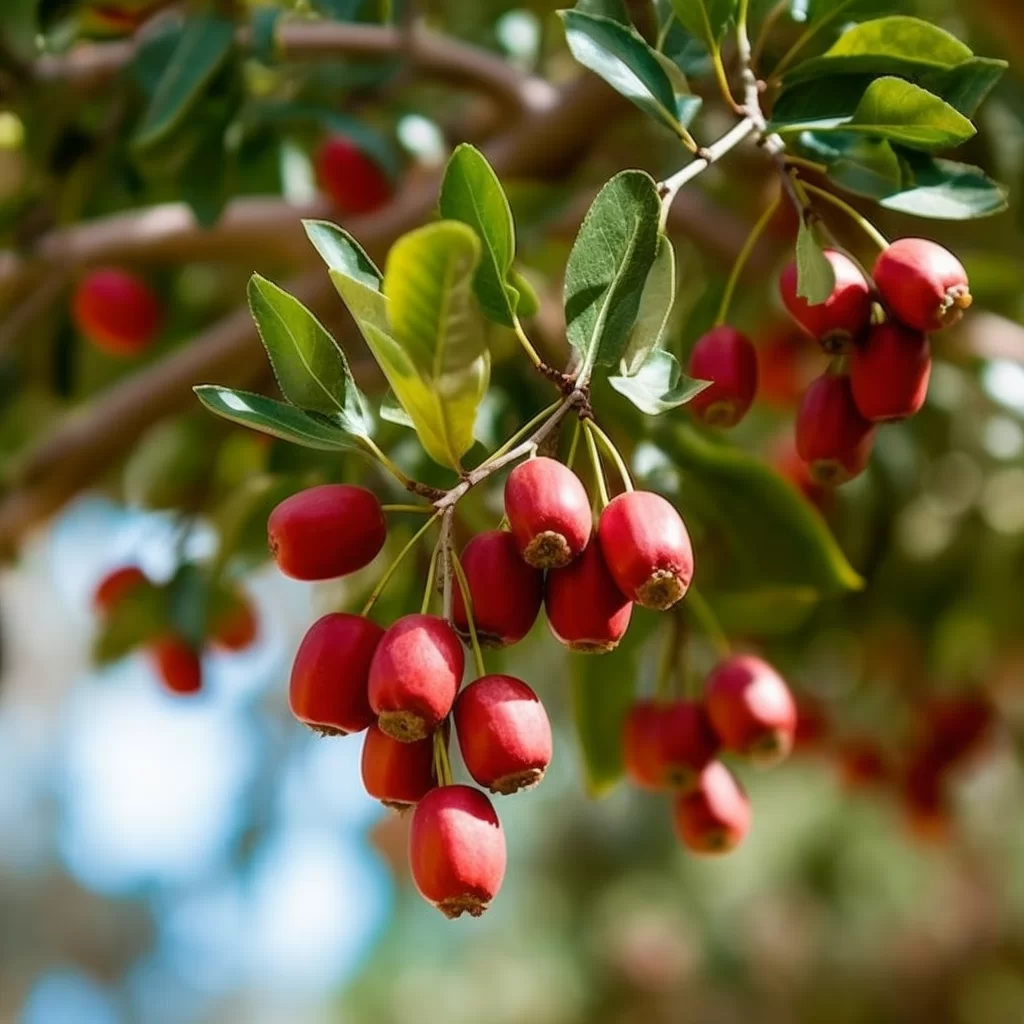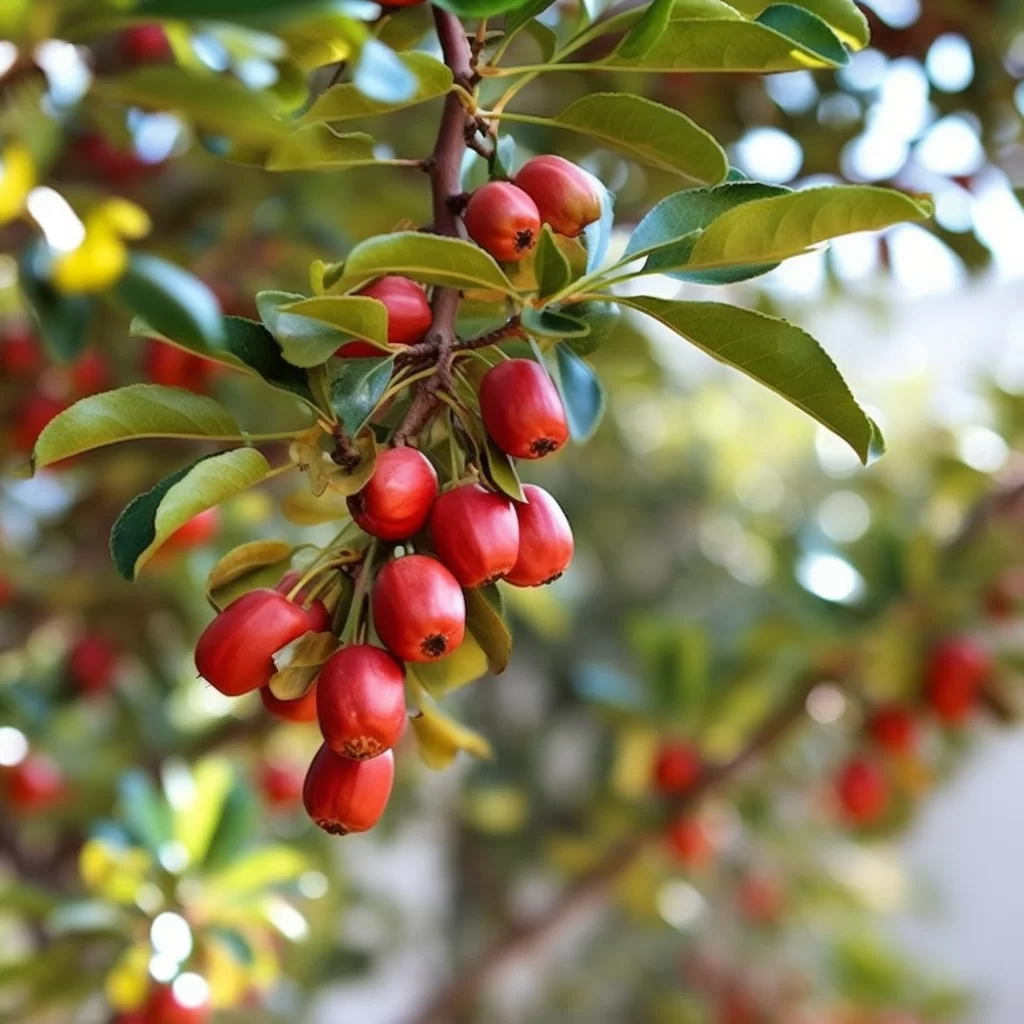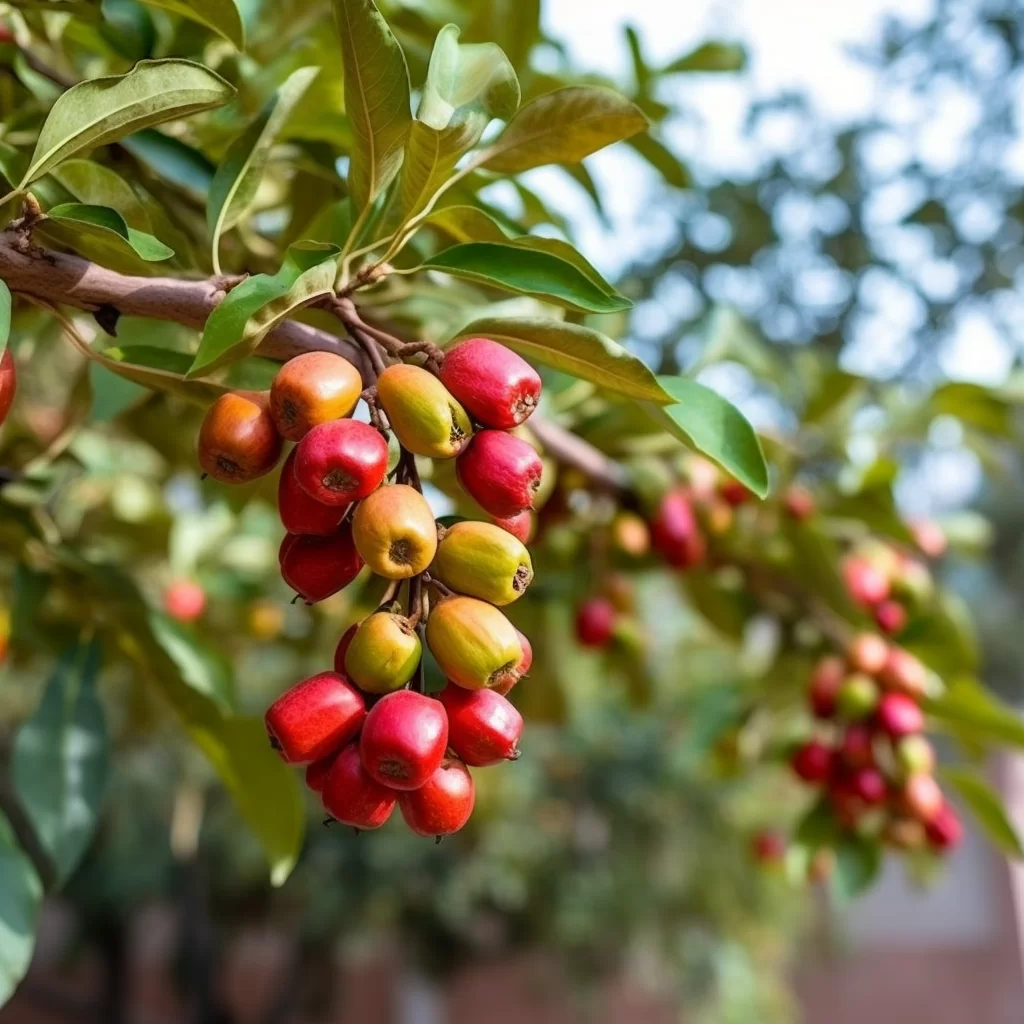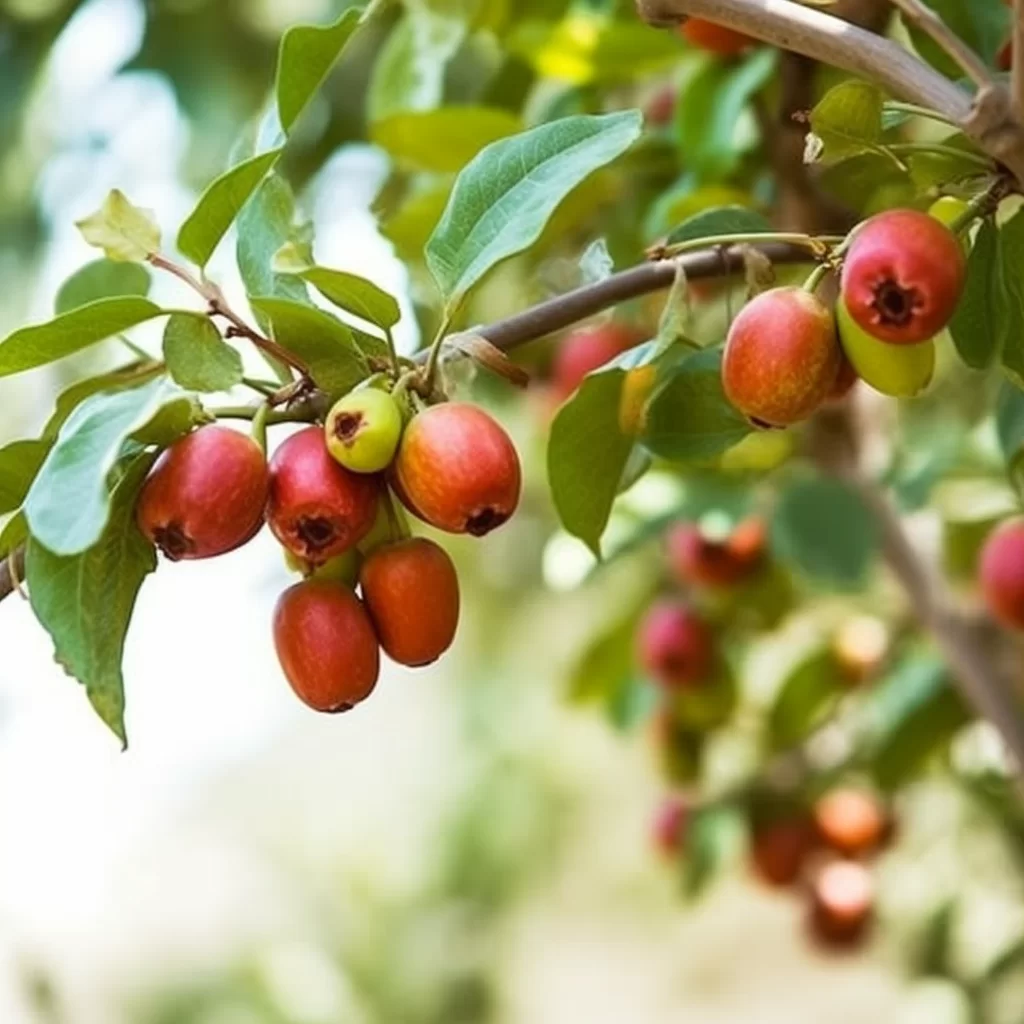Story of Day :
Contents
The Jujube Plant: A Complete Guide and Care Tips
If you’re a gardening enthusiast and adore growing unique fruits, then you can’t miss out on the jujube plant.
This tree is renowned for producing small, red fruit that boasts a flavor profile that blends together the sweetness of an apple with the chewy texture of a date.
While it’s also known as Chinese date or red date, don’t be confused with the Medjool dates we often consume in our daily diets since they belong to different species.Jujube plants are relatively easy to grow and maintain once established.
They are adaptable to various soil types and can thrive in both hot and cold climates.
The fruits themselves are high in antioxidants, vitamins A and C, fiber, iron, calcium – making them a nutritious snack option too! Besides being eaten fresh or dried as a healthy snack alternative or used for baking desserts like cakes or pies – jujubes have been hailed for their medicinal properties in traditional Chinese medicine for centuries.
Overview of Jujube Plant
The Jujube plant, also known as Ziziphus jujuba, is a tree that is native to China.
Over time, it has spread and become naturalized in various parts of Asia, Europe and Africa.
Belonging to the Rhamnaceae family, this deciduous tree or shrub boasts thorny branches and can grow up to 40 feet tall if given favorable conditions.
However, it typically grows to a height of around 25 feet. The Jujube plant is an interesting species that has been introduced into many different regions worldwide due to its adaptability.
The Jujube plant is an interesting species that has been introduced into many different regions worldwide due to its adaptability.
It can thrive in various soils and climates while still producing fruit for consumption or medicinal purposes.
Some cultures even consider the fruit of this plant as a symbol of good luck.
With its versatility and resilience, it’s no wonder that the Jujube plant remains an essential component in many different ecosystems across the globe today!
The leaves are green with an oval shape that can measure up to two inches long.
They have a shiny surface on top and are slightly hairy underneath.
The flowers are small, yellow-greenish with five petals that bloom from May through June.
The fruit that this plant bears is one of its most distinctive features; it’s round or elongated about one inch long with red-brown color when ripe.
It has white flesh inside which is juicy and sweet though slightly acidic taste; some describe it as having notes of apple flavor combined with chewy texture similar to dates.
Care Tips for Jujube Plants
Jujubes are incredibly low-maintenance plants that need only a little bit of care to thrive.
This makes them perfect for those who are new to gardening or do not have a lot of time to devote to their garden.
Once established, jujube trees require very little water and fertilization, and they can grow in a variety of soil types.
They are also highly resistant to pests and diseases, which means that they don’t need any chemical treatments or special attention.
Overall, these features make jujubes the ideal plant for those who want an easy-to-care-for addition to their garden. One of the most significant advantages of jujubes is their ability to adapt quickly and easily in different growing conditions.
One of the most significant advantages of jujubes is their ability to adapt quickly and easily in different growing conditions.
Whether you live in a dry area with minimal rainfall or an area with harsh winters, jujube trees can survive it all without much fuss.
With just minimal pruning during dormancy periods will keep your tree healthy while maintaining its shape and size.
Jujube fruits ripen on the tree so no laborious picking is required as compared with other fruit crops like apples or peaches which must be harvested at optimum times manually; however if you have heavy bird traffic around your home consider using netting material over your tree trunk for protection from overly excited birds! Whether you’re looking for an attractive shade tree or an easy-to-grow fruiting plant, Jujubes are definitely worth considering as one of your garden choices!
If you’re planning on growing jujubes, there are a few things to keep in mind.
Firstly, these plants thrive in sunny areas so it’s important to choose a location that gets plenty of sunlight throughout the day.
Jujube trees are also quite hardy and can grow well even if the soil quality isn’t great – whether it’s sandy, loamy or clay-based.
This makes them ideal for those who want to grow fruit without worrying too much about soil conditions.
In addition to this, jujube plants can tolerate drought which means they can survive in areas with limited rainfall.All things considered, growing jujubes is relatively easy and requires minimal effort compared to other fruit-bearing plants.
As long as you plant them in an area that receives ample sunlight and has any kind of soil type (whether poor or rich), they’ll do just fine! Additionally, if your area experiences droughts often, worry not because these resilient trees can adjust well even with minimal watering requirements!If you’re looking to grow jujubes, there are two main methods: starting from seeds or grafting onto a rootstock.
However, if you want to ensure the health and success of your jujube plants, it’s recommended that you purchase seedlings from reputable nurseries.
By doing so, you’ll be getting healthy specimens with well-developed root systems that will give your plant a better chance of survival. Starting jujubes from seeds can be a bit trickier and requires more patience as it can take several years for the plant to mature.
Starting jujubes from seeds can be a bit trickier and requires more patience as it can take several years for the plant to mature.
Grafted plants tend to produce fruit faster and have a higher chance of producing consistent yields each year.
Ultimately, whether you choose to start from seed or graft onto a rootstock is up to personal preference and experience level in gardening; just remember that purchasing seedlings from reputable nurseries is always the safer option.Jujube plants do not demand a great deal of water, which makes them ideal for areas that experience extended dry periods.
Once these trees have been established, they can survive for considerable periods without water.
However, it is essential to deep-water them occasionally during prolonged droughts to ensure their continued growth and vitality.
This means that while jujubes are resilient plants that can withstand harsh environmental conditions, a bit of TLC in the form of occasional hydration goes a long way in keeping them healthy.When it comes to irrigation needs, jujubes are comparatively low-maintenance plants.
They have the ability to endure tough circumstances and even survive with minimum amounts of water for extended timeframes after they’ve rooted themselves well into the ground.
In spite of this resilience though, proper watering techniques prove vital during extensive bouts of dry spells as it promotes optimal growth and health throughout their lifespan.
Thus, if you’re looking for an easy-to-care plant species that won’t require too much effort on your end but still offers some flexibility when it comes to maintenance schedules – then jujubes may be right up your alley!Jujube plants have specific preferences when it comes to their soil and fertilizer requirements.
To ensure that they thrive, it’s important to maintain a slightly acidic pH level in the soil, which should fall within the range of 6.5-7.5.
This helps to create an environment that is conducive for their growth and development. Moreover, applying a balanced NPK (nitrogen-phosphorus-potassium) fertilizer during springtime will supply all the necessary nutrients needed for optimal growth.
Moreover, applying a balanced NPK (nitrogen-phosphorus-potassium) fertilizer during springtime will supply all the necessary nutrients needed for optimal growth.
It’s essential not to over-fertilize jujube plants since this can harm them in various ways by creating an imbalance in their nutrient intake or even lead to toxicity, resulting from chemical build-up.
By following these few simple steps when fertilizing jujube plants, you can help keep them healthy and thriving throughout the season!Jujuve, an agricultural enterprise, experiences minimal issues with pests and diseases.
However, there are times when they may encounter fruit flies or aphids which can be managed through natural methods using neem oil spray or insecticidal soap solution.
These organic solutions prove to be effective in controlling these pesky insects without harming the crops or disturbing the surrounding environment.As a responsible and environmentally-friendly business, Jujuve prioritizes the use of sustainable approaches to manage pest and disease issues.
They understand that traditional chemical-based treatments can have detrimental effects on both human health and the ecosystem as a whole.
By utilizing natural remedies like neem oil spray or insecticidal soap solution to control pests and diseases, Jujuve ensures that their produce is not only healthy but also safe for consumption by their customers.
Overall, this approach promotes sustainability while maintaining high-quality standards in farming practices at Jujuve.If you are planning to harvest jujube fruits, there are a few things you need to know to get the most out of your crop.
Firstly, it is important to wait until the fruit has fully ripened before harvesting.
This will ensure that the fruit is sweeter and more flavorful.
You should also avoid picking any damaged or bruised fruits as these will not last as long in storage.Once you have harvested your jujube fruits, it’s time to think about how best to store them.
Jujubes can be stored for several months if they are kept in a cool and dry place such as a pantry or cellar.
If you want them to last even longer, consider drying them out by leaving them in direct sunlight for a few days or using a dehydrator.
Dried jujubes can be stored for up to a year and make great snacks on their own or used in recipes like trail mix or baked goods!
- The jujube fruit ripens over several weeks in late summer into fall depending on the region of cultivation.
- Harvest when the fruit skin starts turning red-brownish color though some cultivars may remain green even when ripe; for instance Shuimen jujube cultivar harvested when still greenish-yellow
- Storage: Jujube fruit can be stored at room temperature for several weeks or refrigerated in plastic bags with holes for ventilation to prevent colonization by molds and bacteria.
To harvest ripe fruits, carefully cut each one off the tree using scissors or pruning shears attached close to stem leaving a thin tail of about 1 inch long attached at either end of fruit.; this helps extend their shelf life while stored indoors.
The Benefits of Jujube Plant
In addition to satisfying your sweet tooth, the jujube plant offers a plethora of benefits.
For centuries, its fruit has been used in traditional medicine to alleviate stress and promote relaxation.
Moreover, studies have shown that jujube extract can lower anxiety levels and improve sleep quality.But that’s not all – the jujube plant also contains high levels of antioxidants and vitamin C, which are essential for maintaining a healthy immune system.
Its leaves can also be brewed into tea which is believed to have anti-inflammatory properties that may help with digestive issues and even reduce the risk of certain types of cancers.
With all these health benefits packed into one small fruit, it’s no wonder why the jujube plant has been valued throughout history as more than just a tasty treat!
- The fruit is rich in vitamin C, calcium, iron, and antioxidants that boost immunity, improve digestion system and protect cells from oxidative stress.
In traditional Chinese medicine, the leaves of a certain plant have been found to be an effective remedy for insomnia.
This is because they contain natural sedatives that can help calm the mind and body, making it easier to fall asleep.
Additionally, the leaves are rich in flavonoids which have been shown to lower blood pressure levels.
So not only can this plant help with sleep issues, but it may also have benefits for those looking to manage their hypertension.For those who struggle with getting a good night’s rest or managing high blood pressure levels, incorporating this natural remedy into their routine could be worth considering.
However, as with any herbal supplement or medication, it’s important to consult with a healthcare professional before use and ensure that any potential interactions or side effects are understood beforehand.Did you know that the bark of certain trees actually contains compounds that can help alleviate coughing symptoms? Saponins, which are found in this bark, have been used in many different cough syrup formulations.
These compounds work by breaking down mucus and helping to soothe irritated respiratory passages, which can provide relief for those with coughs or other respiratory issues.Due to its natural properties and ability to effectively treat coughs, the bark containing saponins has become a popular ingredient in many over-the-counter cough syrups.
Whether you’re dealing with a persistent dry cough or just need some relief from seasonal allergies or a cold, these syrups may be able to help you find some much-needed relief.
So next time you’re at the drugstore looking for something to ease your symptoms, be sure to check out some of these natural remedies containing this beneficial tree bark extract!To wrap things up, it’s important to reflect on the main points discussed throughout this article.
Firstly, we addressed the issue of climate change and its devastating impact on our planet.
We highlighted some of the root causes such as greenhouse gas emissions and deforestation while also discussing potential solutions like renewable energy sources and sustainable farming practices.Secondly, we delved into the importance of mental health and wellness in today’s fast-paced society.
We emphasized that taking care of our mental health is just as crucial as physical health, especially in light of recent events such as the COVID-19 pandemic.Overall, it’s clear that there are many pressing issues facing our world today.
However, by acknowledging these challenges and taking proactive steps towards positive change both at an individual level and within communities, we can work towards a brighter future for all.
Jujube trees can be a great addition to any garden, especially for those looking to add a tropical flair.
Not only do these trees provide an exotic aesthetic, but they also boast an array of health benefits thanks to their nutritious fruits.
By planting jujube trees in sunny areas with well-draining soil and providing occasional deep watering during extended periods of drought, gardeners can ensure the healthy growth and development of their trees.
Additionally, fertilizing with balanced nutrients like NPK once per year will further promote this growth and help create strong roots that will last for years to come.In order to create a thriving jujube tree in your garden, it’s important to follow proper care tips throughout the year.
From planting in optimal conditions to regular watering and fertilization, all aspects need careful attention for your tree’s success.
However, with its easy-to-grow nature and delicious fruit rewards at harvest time – not to mention its impressive health benefits – adding a jujube tree is sure to bring both beauty and function into any home garden.If you have a fruit tree in your garden, it’s important to know when the fruits are ripe and ready for harvesting.
Once they’re fully grown and matured, use scissors or pruning shears to carefully pick them from the tree.
It’s best to do this gently, as rough handling could damage the fruit or even injure the tree itself.
Once you’ve collected your fruits, store them properly depending on what you plan on doing with them.Storing your freshly picked fruits is crucial in keeping them fresh and delicious for longer.
If you plan on consuming them within a few days of harvesting, simply place them at room temperature away from direct sunlight.
However, if you want to preserve their freshness for a longer period of time, refrigeration is necessary.
This will slow down their ripening process and keep them tasting just as good as they did when first picked from the tree!If you’re looking for a plant that will do more than just look pretty in your garden, consider adding jujubes.
These trees not only have an attractive appearance with their shiny green leaves and interesting bark texture, but they also produce fruit that is packed with nutrients.
Jujube fruit is high in vitamins and minerals such as vitamin C, potassium, and iron.
Additionally, it has been used for medicinal purposes for centuries in traditional Chinese medicine to help with conditions like anxiety and insomnia.Jujubes are a great choice if you’re interested in growing your own healthy food or exploring natural remedies.
Not only are the fruits delicious fresh off the tree or dried like dates, but they may also provide health benefits.
Furthermore, jujube trees are easy to care for as they can tolerate drought and heat while being relatively pest-resistant.
Therefore if you want to add beauty and value to your garden while enjoying tasty fruits rich in nutrients or trying out some ancient herbal remedies,jusubus plant would be an excellent option!